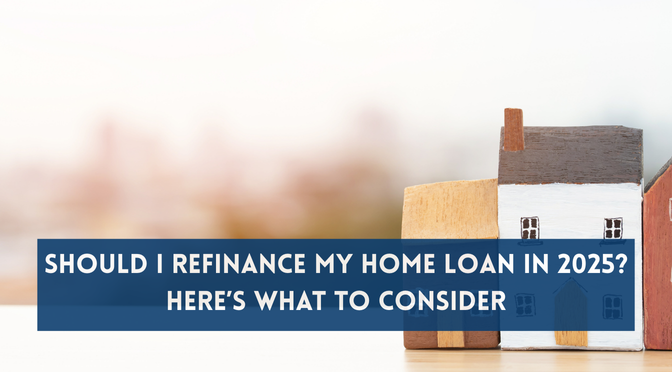Introduction to Refinancing in 2025
As 2025 unfolds, many homeowners are asking an important question: Should I refinance my home loan in 2025? Refinancing can be a smart move if it helps you lower your interest rate, reduce your monthly payments, or pay off your loan faster. However, it is not the right choice for everyone. Understanding the benefits and risks of refinancing can help you decide whether it is worth pursuing this year.
Premium Select Finance has supported countless Australians through refinancing decisions. With the right information, you can determine if refinancing in 2025 aligns with your financial goals. The key is to carefully evaluate your current loan, the market, and your long-term plans before making any decisions.
What Does Refinancing Mean?

Refinancing means replacing your current mortgage with a new one, often with different terms. Homeowners usually refinance to secure a lower interest rate, change the length of their loan, or switch from a variable to a fixed rate. In some cases, refinancing can also be used to access equity in your property.
When you refinance, your old loan is paid off and replaced with a new agreement. This process gives you the opportunity to reset the terms of your mortgage, ideally in a way that improves your financial situation. Just like any major decision, it requires careful thought and expert advice.
Why Consider Refinancing in 2025?
The financial environment in 2025 will influence whether refinancing is a good option. Interest rates may shift, property values may change, and personal circumstances will play a role. If interest rates drop or remain competitive, refinancing could help you save significantly over the life of your loan.
Another reason to refinance in 2025 could be personal goals. For example, if you want to reduce your monthly expenses, refinance into a shorter loan term, or access funds for renovations, refinancing may be the right path. The key is to look at how the current year’s financial climate matches your needs.
The Benefits of Refinancing
One of the most common benefits of refinancing is securing a lower interest rate. Even a small reduction in your rate can lead to substantial savings over time. Lower monthly payments can also ease your budget and free up funds for other goals.
Another benefit is flexibility. Refinancing may allow you to switch from a variable rate to a fixed rate, giving you more certainty about your repayments. Additionally, you can consolidate other debts into your mortgage, making repayments simpler and potentially reducing the overall interest you pay.
The Costs and Risks of Refinancing
Refinancing is not free. Lenders may charge fees for setting up a new loan, and there may be exit fees or break costs if you leave your current mortgage early. These costs can add up, and it is important to calculate whether the savings outweigh the expenses.
There is also the risk of extending your loan term. While refinancing might lower your monthly payments, adding extra years to your mortgage can increase the total interest you pay. Understanding these trade-offs is essential before making a decision.
How to Know If Refinancing Is Right for You
The decision to refinance depends on your financial situation and goals. If your current loan has a high interest rate compared to what is available in 2025, refinancing could be a wise choice. Similarly, if you want to pay off your loan faster or consolidate debts, refinancing might help.
However, if the costs of refinancing outweigh the savings or if you plan to move house soon, it might not be the right time. Asking yourself, “What do I want to achieve by refinancing my home loan in 2025?” is the best starting point. From there, you can evaluate options with a clear purpose.
Steps to Take Before Refinancing
Before refinancing, review your current mortgage. Look at your interest rate, monthly payments, and remaining loan term. Understanding these details will help you compare offers accurately.
Next, research the market. Compare rates and features from different lenders. Keep in mind that the lowest rate is not always the best option—flexibility and loan features matter too. Finally, talk to a finance expert, such as the team at Premium Select Finance, to ensure you fully understand your options.
Working with Experts for Better Results
Refinancing can be complex, but you do not have to do it alone. Mortgage brokers and finance experts can simplify the process and help you find the best solution for your needs. They have access to a wide range of lenders and can explain the pros and cons of each option.
Premium Select Finance prides itself on treating clients like family. They take the time to understand your goals and provide clear, trustworthy advice. With their guidance, you can approach refinancing with confidence and make decisions that support your long-term financial success.
The Long-Term Impact of Refinancing
When you refinance, you are not just adjusting your current payments—you are shaping your financial future. The right refinancing decision can free up cash, reduce stress, and even help you invest in other opportunities. Over time, these changes can make a significant difference in your lifestyle and security.
On the other hand, rushing into refinancing without fully considering the risks could leave you with more costs and less flexibility. That is why it is so important to take the time to evaluate your options and work with professionals who put your best interests first.
So, should you refinance your home loan in 2025? The answer depends on your financial situation, your goals, and the current market. For many, refinancing will provide valuable savings and peace of mind. For others, staying with their current loan may be the better choice.

